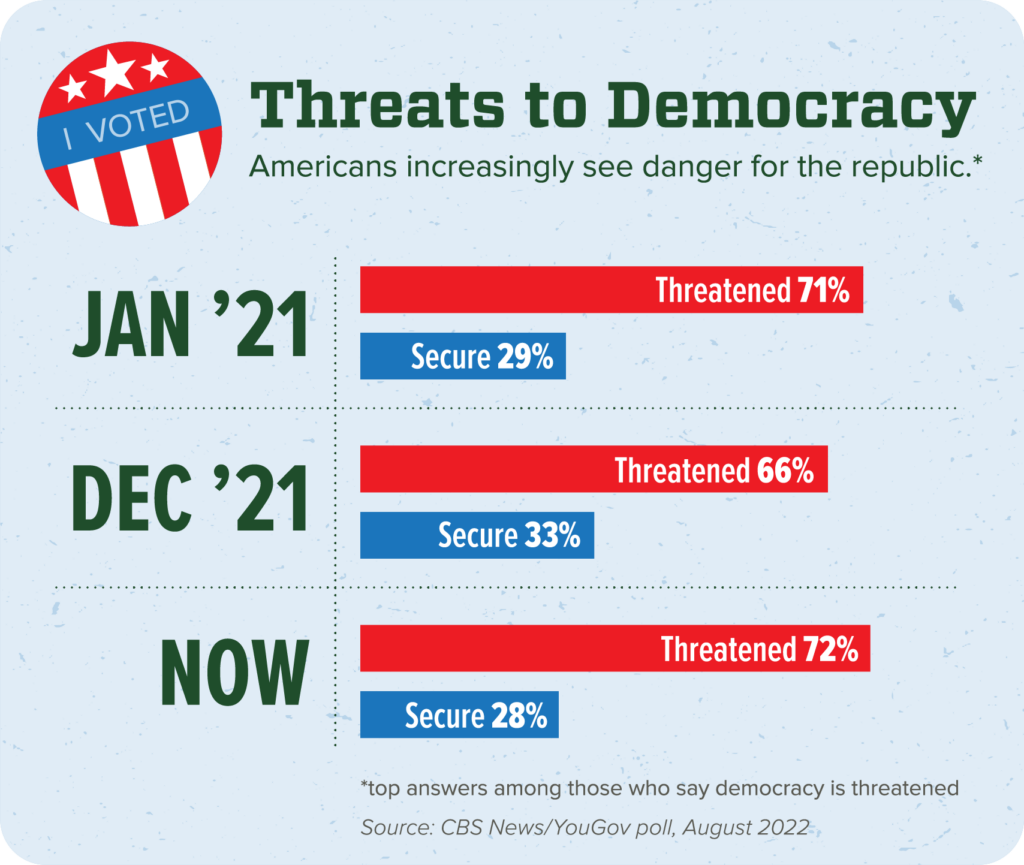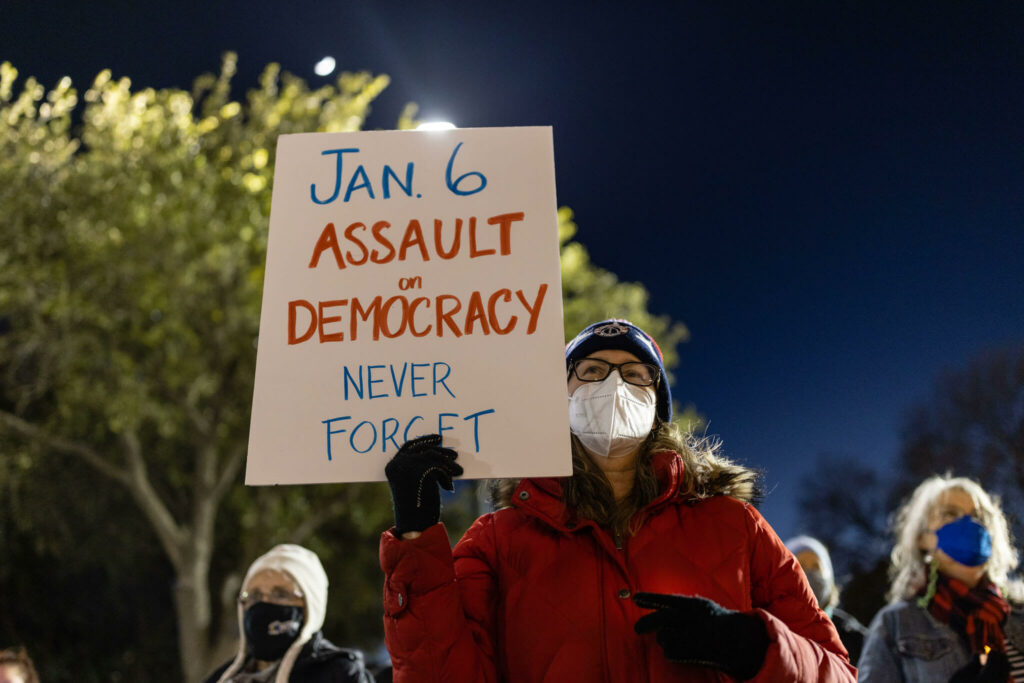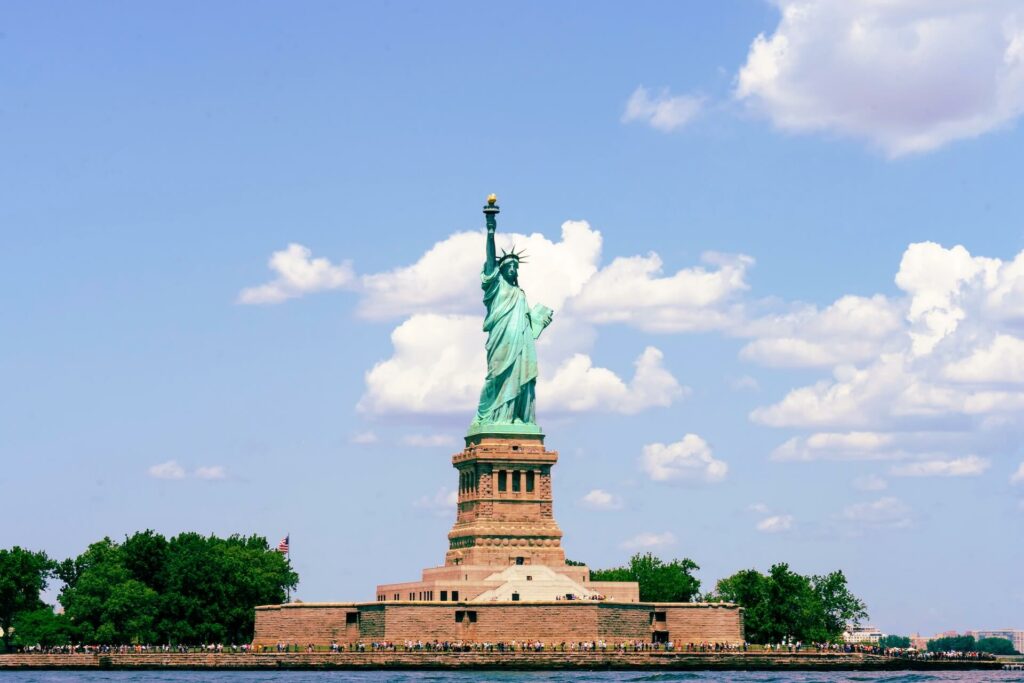The United States is the world’s oldest constitutional democracy, yet here and across the globe, democratic systems are at risk due to polarization, declines in institutional trust, enhanced partisanship, and a lack of understanding related to our complex systems of government.
A recent Gallup poll shows that overall confidence in U.S. institutions sits at record lows, with only 27 percent of Americans expressing “a great deal” or “quite a lot” of confidence in 14 major U.S. institutions, including key instruments of democratic government such as the Supreme Court and Congress, as well as public education and newspapers. As a result, 61% of Americans say significant changes to the fundamental design and structure of government are needed to make it work for current times. This lack of trust in our governmental and media institutions corresponds to a growing lack of confidence and growing partisan dissatisfaction and “even suspicion” of higher education, threatening the role of colleges and universities as pillars of American society.

Credit: Wendy Brookshire, CSU Marketing & Brand ManagementDemocracy and Resilience
Democracy is a system of government in which power is vested in the people; the people have a say in how they are governed and have a voice in the decisions that affect their lives. Resilience is the ability to adapt and recover in the face of adversity. A resilient democratic society provides citizens with the opportunity to express divergent and even conflicting opinions, participate in the political process, and through that process, manage conflicts in productive ways.
In his essay, From Crisis to Opportunity: Rethinking the Civic Role of Universities in the Face of Wicked Problems, Hyper-Partisanship, and Truth Decay, CSU communication studies Professor Martín Carcasson writes democratic systems require “high-quality engagement, particularly across perspectives, in order to thrive,” and high-quality engagement requires trust, respect, unbiased sources of information, and an inquisitive citizenry. Democracy, we are learning, requires constant vigilance and active participation from citizens to ensure that it is functioning properly. Several of our centers in the College of Liberal Arts – from the Center for Public Deliberation to the Straayer Center for Public Service Leadership to the Regional Economic Development Institute – provide opportunities for students to learn and practice the essential skills of critical thinking, listening, broad-thinking, and deliberative dialogue in real-world settings guided by our faculty. By engaging in conversations with one another and with community members, our students and faculty are developing the skills needed to bolster and enhance our democracy.
Scholarship and Artistry in the Liberal Arts
Through interdisciplinary collaboration and a commitment to community engagement, our faculty and students are working to address some of the most pressing issues facing society today. Research in the social sciences, humanities, and visual and performing arts advances democratic institutions and their resilience by providing a deeper understanding of the human experience. By studying the ways in which people interact with each other and with their environment, our faculty can identify patterns of behavior and develop strategies for improving individual and community well-being.
For example, during the height of the COVID-19 pandemic, it seems that no amount of scientific data could persuade some people to take what was proven to be a very effective vaccine that prevents death and serious illness. Given the facts, why weren’t people convinced? Our anthropologists, sociologists, and health communicators wanted to find out, so they sought communities across Colorado to speak with about their beliefs and values and how those aligned, or didn’t, with the scientific literature about the virus and the vaccine. By engaging locally with communities, asking questions – and listening – these faculty and students were able to learn more about what motivates people and provided insight into what might change people’s minds.
We understand that researchers in history, political science, philosophy, ethnic studies, and sociology can help promote democratic institutions by examining the role of power and authority in society.
They study ways in which power is distributed and maintained, enabling us to promote more equitable and inclusive political systems. Research on voting rights and political participation, for example, can inform efforts to increase voter turnout and encourage citizen engagement in the political process, including more voices that were once silenced or ignored.
In the performing arts, music, dance, and theater can serve as platforms for marginalized voices to be heard and for critical dialogue and reflection on issues of social justice and equity. Dance can express an individual’s experience of oppression while theater can raise questions about our past and our future that allow us to contemplate an issue while connecting us with our emotions.
Sometimes the work of entire academic departments centers around the question of information and facts. Members of the journalism and media communication department research how social media has impacted communication, news consumption, and the de-prioritization of facts, as well as how identity is constructed through online games or platforms. Our faculty conduct detailed studies on how social media algorithms shape users’ news feeds and affect their exposure to diverse perspectives, or how social media has facilitated the spread of misinformation and disinformation. Faculty in the Department of Political Science have studied this as well, providing students an opportunity in their capstone class to learn about, identify, and provide resources against misinformation and disinformation in online publications and platforms. By investigating these issues, our faculty and students are helping to identify the challenges facing the news media and developing strategies for promoting a more informed and engaged citizenry.

A woman holds a sign at a candlelight vigil on Jan. 6, 2022, to mourn the one-year anniversary of the attack on the U.S. Capitol. Credit: Jordan Vonderhaar for The Texas Tribune.At other times, issues and interests cross departments and are interdisciplinary in scope. Faculty from the communication studies, journalism and media communication, English, and art departments focus on free speech, looking at how the First Amendment protects academic freedom and individual expression, and have explored the implications of restrictions on these rights. They also have examined the role of the press in holding those in power accountable and have analyzed the impact of government surveillance on freedom of the press. These researchers are contributing to the development of legal and policy frameworks that protect the rights of citizens and promote a more resilient democracy.
In fact, our entire college (and the University) will emphasize democracy via our thematic year during the 2023-2024 academic year. Our liberal arts faculty committee of 13, plus a variety of campus partners in our units across campus, are actively working to create a resource library, a series of events and learning opportunities, voter registration and promotion efforts for students, and civic education for campus and community to engage with the topic of democracy and, specifically, how we strengthen the building blocks of democracy so that we can ensure its resilience amid the storms of autocracy and disinformation.
We have many researchers whose individual contributions mark them as national and international leaders in understanding resiliency and democracy. From research on legislative institutions, interest groups, and representation that analyzes the strategies that interest groups use to influence policy outcomes in Congress, including lobbying, electioneering, and coalition-building, to identifying the gender stereotypes and structural barriers that provide obstacles to women’s participation in politics, to the economic impact of natural resource management policies and more sustainable approaches to economic growth and resilience in natural resource-dependent economies, our faculty are leading the way across multiple disciplines to provide insight and recommendations for how to build a better democracy.
Our Responsibility to Democracy
For public, land-grant institutions like Colorado State University, established in 1870 following the Morrill Act of 1862, Colorado A&M honored democracy and civics as core principles from the onset, through pragmatic and transformative educational experiences benefiting “the industrial class” and through research benefiting citizens and communities across the state of Colorado. CSU became a university by investing in research and teaching that advanced issues of public importance, including energy systems, food systems, water issues, natural resources, and sustainability.

But the 21st century brings new challenges, and one of the most important values we can instill in our students is the importance of democracy. Further contributions in our traditional areas of strength, such as water, energy, and sustainability, will depend on how we build trust in the institutions that inform, attract, and mobilize our constituents. This requires that CSU, as an institution of higher learning, prioritize and strategize around our approaches to, and touchpoints with, civic and democratic systems; continue to cultivate wisdom in our students, staff, faculty, and alumni; conduct research impacting communities on issues of public importance; and serve as a bridge during periods of political unrest and transformation. Through education and engagement, we can build a more resilient and democratic society that benefits us all. By doing so, we can help create a society where everyone has a voice and individuals are empowered to overcome the challenges that we face.
Benjamin Withers is dean of the College of Liberal Arts and a professor of art history. Beth Etter and Sam Houghteling of the College of Liberal Arts contributed to this story.